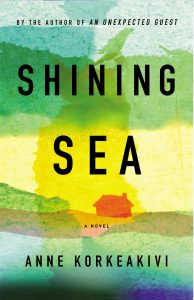Objective Estrangement
Tools: The Power in Writing Where You Aren’t

Retouched (light)
As an American author living in Geneva, I am often asked whether I am working on a novel set in Switzerland. White-peaked mountains, banking intrigue, anything chocolate. The potential is massive. Usually I say no. My latest novel manuscript contains one brief passage relating to the country where I’ve lived for the past decade.
But who’s to say I am not gathering material for the Swiss novel I’ll eventually publish? Used purposefully, time and/or distance can be a powerful tool for the fiction writer.
I wrote my first novel, An Unexpected Guest, which is set in Paris, Boston, and Dublin, while living in eastern France and in Brooklyn. I wrote my second, Shining Sea, which is set in Southern California, Arizona, the Scottish Hebrides, Manhattan, and western Massachusetts, after moving to Switzerland. I’d been to (nearly) all of the places that appeared in each of the novels and had lived in several of them. But I wasn’t living in them while I wrote these books.
There’s a unique clarity that comes through having distance from something, someone, or someplace with which or whom the writer is familiar. I call it “objective estrangement.” It means being able to see the forest for the trees, while still knowing the sound of the wind through their branches in deep winter, the color of their leaves in autumn, their smell in early spring. It means being able to recognize the universal that will make a story meaningful to others, while retaining the details that will make it feel rich and believable.
Look at it this way.
In journalism, immediacy is a valuable commodity. The journalist doesn’t want facts to become clouded by reflection. But literary fiction, the genre I write in, is about reflection. The intrusion of practical, real-life, and personal concerns that have nothing to do with the story’s narrative and characters–this is the street with a pharmacy where I should pick up a prescription; this is the neighborhood where the friend who hasn’t returned my call lives—into the writer’s mindspace is not going to be helpful.
As Nobel laureate Abdulrazak Gurnah, whose fiction often takes the reader to the East Africa he left to live in Great Britain more than a half-century ago, says, “Traveling away from home provides distance and perspective, and a degree of amplitude and liberation. It intensifies recollection, which is the writer’s hinterland. Distance allows the writer uncluttered communion with this inner self, and the result is a freer play of the imagination.”
That freedom is one reason why, for example, I placed the family at the heart of Shining Sea in Southern California, where I lived for two years in my twenties but is clear across the continent from where I grew up in New York City. The emotionality of my young California years has long worn off, but I can still remember how it felt weaving through bikini-clad rollerbladers on Venice Boulevard or racing out of my stucco condo during an earthquake. At the same time, Southern California couldn’t be further removed and still be in the continental U.S from where (and how) I grew up. Keeping the story and characters in Shining Sea purely creations of my mind was easy, but so also was imagining and understanding the world they would inhabit.
This shouldn’t be the case, but recognizing the value of distance in time or place might be of particular advantage for women fiction writers, who in our world still often find themselves prioritizing parenting and paying job responsibilities over personal writing projects. I myself have done this. Certainly it’s important for the displaced writer.
Utilizing the perspective of distance may sometimes prove useful for the roman à clef and autobiographical or semi-autobiographical novelist as well. Consider James Baldwin penning Go Tell It on the Mountain in Paris or Sylvia Plath The Bell Jar in London. Tim O’Brien wrote the quintessential Vietnam War novel, The Things They Carried, in Texas some twenty years after returning from his tour of duty in Southeast Asia. When one writes about an experience, one relives it; adding time and/or distance may be helpful to writers in revisiting difficult experiences and writing about them with a mixture of passion and lucidity that will keep them interesting to a dispassionate reader.
Of course, there are numerous acclaimed novels that were written on location and/or in real time. The Old Man and the Sea, about the struggle between an impoverished fisherman and a giant marlin off the coast of Havana, was written by Ernest Hemingway while living in Cuba. Donna Tartt began writing The Secret History, a novel set a tiny, tony New England liberal arts college, while she was a student at the tiny, tony New England liberal arts college Bennington. If there’s one rule that applies in writing fiction, it’s that there are no rules; one person’s process can look completely different than another’s.
It’s not that I could not, would not ever write fiction about my immediate surroundings. Maybe my next work will be the one set in the Alps. But the location I choose will depend not on what’s outside my door but on what makes the best fit for the story I’m planning to tell. It’s gratifying to know there are no expiration dates on tapping locations and experiences from the course of a lifetime.
—
SHINING SEA
 An arresting and absorbing novel that spans decades, drawing us into the turbulent lives of a family in Southern California after the sudden death of the father.
An arresting and absorbing novel that spans decades, drawing us into the turbulent lives of a family in Southern California after the sudden death of the father.
Beginning in 1962 with a shocking loss, Shining Sea quickly pulls us into the lives of forty-three -year-old Michael Gannon’s widow and offspring. Brilliantly described and utterly alive on the page, the Gannon clan find themselves charting paths they never anticipated, for decades to come. Told with a cinematic sweep, Shining Sea transports us from World War II to the present day, crisscrossing from the beaches of Southern California to the Woodstock rock festival, from London’s gritty nightlife in the eighties to Scotland’s remote Inner Hebrides, from the dry heat of Arizona to the fertile farmland of Massachusetts.
Epic, tender, and beautifully rendered, Shining Sea is the portrait of an American family-a profound depiction of the ripple effects of war, the passing down of memory, the making of myth, and the power of the ideal of heroism to lead us astray but sometimes also to keep us afloat.
Category: How To and Tips























